

Tag Questions. Dave's ESL Cafe: Free English Grammar Lessons. Adjective Clauses #1 Adjective Clauses #2 Adjective Clauses #3 Adjective Clauses #4 Adjective Clauses #5 Adjective Clauses #6 Adjective Clauses #7 Adjective Clauses #8 Adjective Clauses #9 Adjective Clauses #10 Adjective Clauses #11 Adjective Clauses #12 Adjective Clauses #13 Conditional Sentences #1 Conditional Sentences #2 Conditional Sentences #3 Conditional Sentences #4 Conditional Sentences #5 Conditional Sentences #6 Conditional Sentences #7 Conditional Sentences #8 Conditional Sentences #9 Confusing Words: Bring and Take Confusing Words: Come and Go Confusing Words: Get #1 Confusing Words: Get #2 Confusing Words: Get #3 Confusing Words: Get #4 Confusing Words: Get #5 Confusing Words: Get #6 Confusing Words: Get #7 Confusing Words: Get #8 Confusing Words: Get #9 Confusing Words: Get #10 Confusing Words: Get #11 Confusing Words: Get #12 Confusing Words: Get #13 Confusing Words: Hang Confusing Words: It's and Its Confusing Words: Lend and Borrow.
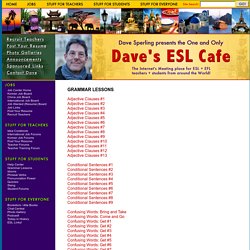
The Top 3 English words you need to know - HAVE. 3 expressions to improve your conversation skills. Slang in English - Bodily Noises - FART, BURP, YAWN, HICCUP, QUEEF. English Grammar - Easy Introduction to Passive. ESL test: Listen vs. Hear. Nevermind or never mind? - Writing for Business. Dec 30 2009 6:47PM GMT Posted by: Ivy Wigmore Tags: Thanks!
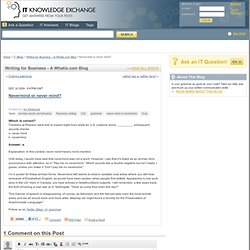
We'll email youwhen relevant content isadded and updated. Following Follow Business writing grammar Quiz Which is correct? Answer: a. Explanation: In this context, never mind means not to mention. Until today, I would have said that nevermind was not a word. I’m a sucker for these archaic forms. This manner of speech is disappearing, of course, as television and the Net pervade even the most remote areas and we all sound more and more alike. Both / both of......neither / neither of......either / either of !! Modal Verbs. English Grammar - Verbs Modal Verbs The modal verbs are can, could, may, might, must, ought to, shall, should, will, and would.
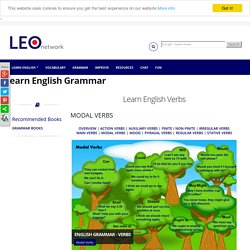
Facebook Twitter Google+ All the auxiliary verbs except be, do and have are called modals. Unlike other auxiliary verbs modals only exist in their helping form; they cannot act alone as the main verb in a sentence. Be, do, and have also differ from the other auxiliaries in that they can also serve as ordinary verbs in a given sentence. The modal verbs are:- Much Many Lot Few Little Difference Quantifiers Grammar Rules.
We use these words as quantifiers that come at the start of noun phrases and they tell us something about quantity.
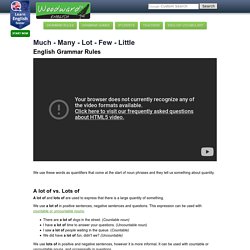
A lot of vs. Lots of A lot of and lots of are used to express that there is a large quantity of something. We use a lot of in positive sentences, negative sentences and questions. This expression can be used with countable or uncountable nouns. There are a lot of dogs in the street. We use lots of in positive and negative sentences, however it is more informal. We have lots of time to catch the plane, let's relax. She has a lot of money = She has lots of money Much vs.
Much and Many are used to express that there is a large quantity of something. Much and Many are used in negative sentences and questions. Say/Tell. Guide Anglais: Decir, Contar. Lesson 7 - Grammar. Part 4.
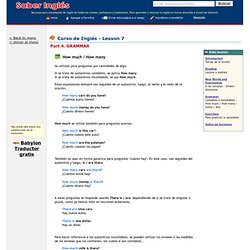
GRAMMAR How much / How many Se utilizan para preguntar por cantidades de algo. Si se trata de sustantivos contables, se aplica How many. Si se trata de sustantivos incontables, se usa How much. Estas expresiones siempre van seguidas de un sustantivo; luego, el verbo y el resto de la oración. How many cars do you have? How much money do you have? How much se utiliza también para preguntar precios. How much is this car? How much are the potatoes? También se usan en forma genérica para preguntar "cuánto hay".
How many cars are there? How much money is there? A estas preguntas se responde usando There is / are, dependiendo de si se trata de singular o plural, como ya hemos visto en lecciones anteriores. There are nine cars.Hay nueve autos. There is one dollar.Hay un dólar. Para hacer referencia a los sustantivos incontables, se pueden utilizar los envases o las medidas de los envases que los contienen, los cuales sí son contables... How much milk is there? There are three litres.Hay tres litros. Prepositions of Time: at, in, on. For - During - While - English Prepositions - English Grammar.